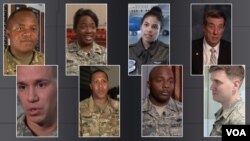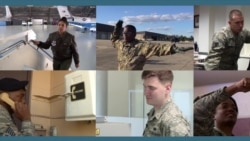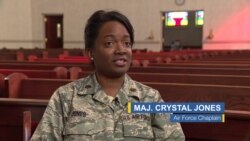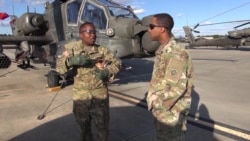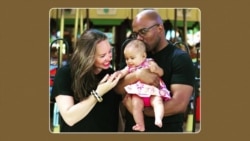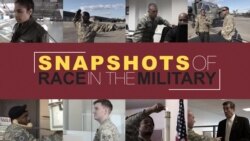Throughout history the American military has been primarily white and male, but today it is increasingly becoming as diverse as the country it serves to protect.
WATCH: Snapshots of Race in the Military: White Males
And this diverse force continues its duty, even as its commander-in-chief, President Donald Trump, is criticized for actions and remarks that appear to aggravate racial tensions in the United States.
Trump has come under fire for comments he made after a white nationalist rally and counter-protest that turned violent in Charlottesville, Virginia last year, during which some said he did not swiftly condemn white supremacists. He has also reportedly made disparaging remarks about immigrants from Haiti and Africa.
WATCH: Snapshots of Race in the Military: African Americans
WATCH: Snapshots of Race in the Military: Immigrants
The top U.S. military leader has urged American service members to remain above the fray.
“You’re a great example for our country right now, and it’s got problems,” Defense Secretary Jim Mattis told troops in Jordan last August, just days after the protests in Charlottesville. “It’s got problems that we don’t have in the military, and you just hold the line, my fine young soldiers, sailors, airmen, and Marines — you just hold the line until our country gets back to understanding and respecting each other and showing it."
WATCH: Snapshots of Race in the Military: Biracial Families
In recent weeks, VOA visited Fort Bragg, North Carolina, home to the "All-American" 82nd Airborne, which calls itself the most diverse division in the United States, and Joint Base Andrews, the president’s home base just outside of Washington, to get service members' perspectives on race relations.
82nd Airborne at Fort Bragg, NC
The 82nd Airborne Division boasts paratroopers from all 50 states and more than 120 nationalities.
"We were the first racially integrated unit in the U.S. Department of Defense, the first division to have female infantry commanders, and this was the first division that was organized with people from all over the country," said Lt. Col. Joe Buccino, communications director for the 82nd Airborne.
WATCH: US Army's 'All-American' Division Puts Spotlight on Nation's Diversity
The soldiers whom VOA spoke with at Fort Bragg say they haven't experienced racial discrimination in the military, but Master Sgt. Jose Colon said he worries about the day he retires and rejoins civilian life.
"I don't see any comradery in the civilian world coming," he said. "I don't know what would trigger that, but we don't seem to be getting any closer."
While the political debate on racism and inclusion dominates headlines, the military continues to welcome recruits from throughout the world, including Staff Sgt. Alfred Kollie, who fled Liberia and lived most of his life in a Ghana refugee camp.
"As a child in Africa, seeing all the chaos and death and destruction, I felt myself that I owe the world to be part of something good and not something evil," Kollie, who now leads a 20-soldier fueling team for the 82nd, told VOA.
WATCH: Airmen at President's Home Base Share Stories of Diversity
Joint Base Andrews in Maryland
However, officials say the military's policy of inclusiveness does not make it immune to discrimination.
“We see it every now and again. Unfortunately, I’m not surprised. We know it’s out there,” said 11th Wing Equal Opportunity Specialist Tom Mahoney.
According to the Joint Base Andrews Equal Opportunity Office, the base of roughly 12,000 troops sees about five to 10 complaints of discrimination each year, with racial discrimination ranking third, after retribution and ageism.
At the base’s chapel, Major Crystal Jones says for years, racism often went undiscussed.
“There is still the 'good old boys' network, and that is normally the 'good old white boys network,” said Jones, a chaplain.
Late last year, a speech from Air Force Academy Superintendent Lt. Gen. Jay Silveria went viral after he denounced racism following an incident at the academy's preparatory school in which racial slurs were found scrawled on dormitory message boards.
He told cadets that if they can’t treat other people with "dignity and respect," then they should simply “get out” of the Air Force Academy.
“It’s the power that we come from all walks of life, that we come from all parts of this country, that we come from all races, that we come from all backgrounds, gender, all make-up, all upbringing,” he said. “The power of that diversity comes together and makes us that much more powerful.”
The incident was later found to be a hoax - the slurs written by an African-American cadet who first reported the message. That student was released from the academy. Still, service members at Andrews say they took great pride in Silveria's remarks, which helped spark greater discourse.
“I think there was a time in our country and our communities where it just wasn’t talked about. Race wasn’t talked about. Now we are living through a time where everybody is talking about it, and so we’re having an opportunity really to work some things out,” Jones said.




